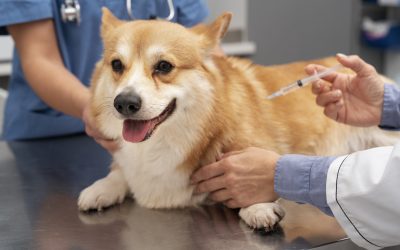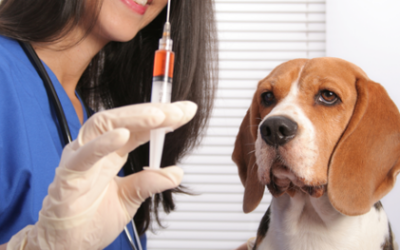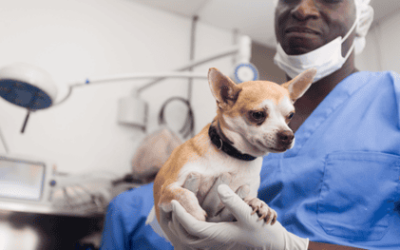What is DAPP Vaccine for Dogs? [Side Effects & Cost]

Protecting your puppy from serious illnesses starts with timely vaccinations. Veterinarians emphasize the importance of core vaccines like the DAPP, which stands for “distemper, adenovirus, parvovirus, and parainfluenza.” This vaccine protects your puppy or adult dog from multiple dangerous viruses.
Let’s explore why the DAPP vaccine is important, the recommended vaccination schedule, how long it is effective, potential side effects, and its associated costs.
Importance of the DAPP (DHPP) Vaccine For Cogs
The DAPP vaccine plays a crucial role in safeguarding your canine companion’s well-being by protecting against four potentially life-threatening diseases:
- Distemper: A highly contagious and often fatal viral disease affecting a dog’s respiratory, gastrointestinal, and nervous systems.
- Adenovirus (Hepatitis): A viral infection that can cause liver disease, eye inflammation, and respiratory problems in dogs.
- Parvovirus: A highly contagious and potentially deadly viral disease that causes severe vomiting, diarrhea, and dehydration in dogs.
- Parainfluenza: A viral infection that contributes to developing respiratory illnesses, such as kennel cough, in dogs.
DAPP Vaccine Schedule and Frequency
The DAPP vaccine (or DHPP) is typically administered in a series of initial puppy shots, followed by regular booster shots throughout your dog’s life. Here’s a general guideline for the DAPP vaccine schedule:
- Puppy Shots: The initial DAPP vaccine series typically begins at 6-8 weeks of age and is administered in a series of three doses, given 3-4 weeks apart.
- First Annual Booster: After the initial puppy series, the first annual booster shot is usually given one year after the last puppy dose.
- Subsequent Boosters: Following the first annual booster, most veterinarians recommend booster shots every 1-3 years, depending on your dog’s risk factors and your veterinarian’s recommendations.
How Long is the DAPP Vaccine Effective?
The duration of protection provided by the DAPP vaccine can vary depending on several factors, including your dog’s age, health status, and the specific vaccine used. Generally, the DAPP vaccine provides immunity for the following durations:
- Initial Puppy Series: The initial puppy series of DAPP vaccines typically provides protection for around 12 months.
- Booster Shots: After the initial puppy series, booster shots are recommended annually or every 1-3 years, depending on your veterinarian’s recommendations and your dog’s risk factors.
Potential Side Effects of the DAPP Vaccine
Like any medication or vaccine, the DAPP vaccine can potentially cause side effects in some dogs. However, these side effects are generally mild and temporary. Some common side effects to be aware of include:
- Mild Fever: A slight elevation in body temperature may occur within 24-48 hours after vaccination.
- Lethargy: Your dog may experience mild lethargy or decreased activity levels for a day or two after vaccination.
- Loss of Appetite: A temporary loss of appetite or decreased interest in food may occur.
- Soreness at Injection Site: Some dogs may experience mild swelling or tenderness at the injection site.
Cost Considerations for the DAPP Vaccine
The cost of the DAPP vaccine can vary depending on several factors, such as your location, the veterinary clinic, and whether you’re getting the initial puppy series or a booster shot. On average, the cost for a single DAPP vaccine dose can range from $33 to $38, but this can vary widely.
The cost of the vaccine itself is just one aspect of the overall veterinary visit. Additional fees may apply for the consultation, examination, and other services provided during the visit. Some veterinary clinics may offer package deals or wellness plans that include routine vaccinations at a discounted rate.
To get an accurate estimate of the total cost, it’s best to consult with your veterinarian or inquire about their pricing for the DAPP vaccine and associated services.
Where to Get the DAPP (DHPP) Vaccine For Your Dog
The DAPP vaccine is typically administered by licensed veterinarians or at veterinary clinics, animal hospitals, or pet vaccination clinics. Here are some common places where you can get the DAPP vaccine for your dog:
- Veterinary Clinics: Most veterinary clinics offer the DAPP vaccine as part of their routine vaccination services. This is often the most convenient option, as your veterinarian can ensure proper vaccine administration and monitoring.
- Animal Hospitals: Many animal hospitals, particularly those associated with veterinary schools or larger veterinary practices, offer vaccination services, including the DAPP vaccine.
- Pet Vaccination Clinics: Some pet stores, feed stores, or mobile vaccination clinics may offer the DAPP vaccine at a lower cost, but it’s important to ensure that the vaccine is administered by a licensed veterinarian or trained professional.
- Rescue Organizations or Shelters: Some animal rescue organizations or shelters may offer low-cost vaccination services, including the DAPP vaccine, for pet owners in need of financial assistance.
How Can Pet Insurance Help You if Your Dog DAPP Vaccine?
Odie’s Wellness plan can be a valuable tool in managing the costs of the canine DAPP vaccine. By having a pet insurance policy in place, you can have peace of mind knowing that you can provide medical care for your furry companion without worrying about the financial burden. Pet insurance can help cover the costs of veterinary consultations, diagnostic tests, medications, and even specialized treatments if required.
Reimbursement
This method is the most common for pet insurance companies. You pay out of pocket for the veterinarian bill, and then the insurance company reimburses you for what’s covered under the insurance plan. The steps look like this.
- You pay the vet bill after your dog’s visit.
- You fill out the pet insurance claim form.
- Submit the claim form and other required documentation to the insurer.
- After the claim is approved, you will be reimbursed for eligible expenses.
What Does Odie Pet Insurance Cover?
Pet insurance covers various veterinary expenses, providing financial protection and peace of mind for pet owners. Here are the details of the coverage options offered by Odie Pet Insurance:
Illness & Injury Plan
The Illness & Injury Plan is an all-inclusive insurance plan designed to cover a wide range of medical needs for your pet. This plan includes comprehensive coverage for various illnesses, injuries, and veterinary services. Some of the covered items include:
- Veterinary exams and consultations
- Diagnostics (e.g., X-rays, lab tests)
- Prescribed medications
- Surgeries and hospitalization
- Rehabilitation, acupuncture, or chiropractic treatments
- Medically necessary supplies
- Euthanasia and cremation
The Wellness Plan
The Wellness Plan is a monthly membership that focuses on preventive care and covers routine veterinary services.
- Provides reimbursements for routine care items such as wellness visits (exams and vaccines), testing and parasite prevention, dental cleanings and at-home dental care, vitamins, supplements, and more.
- Through Odie’s partnership with Petivity, a leader in smart pet products and proactive care, Wellness Plan members can also receive reimbursements for Petivity devices and health kits, as well as eligible Purina food and supplements.
- Total reimbursement up to $700 per year.





